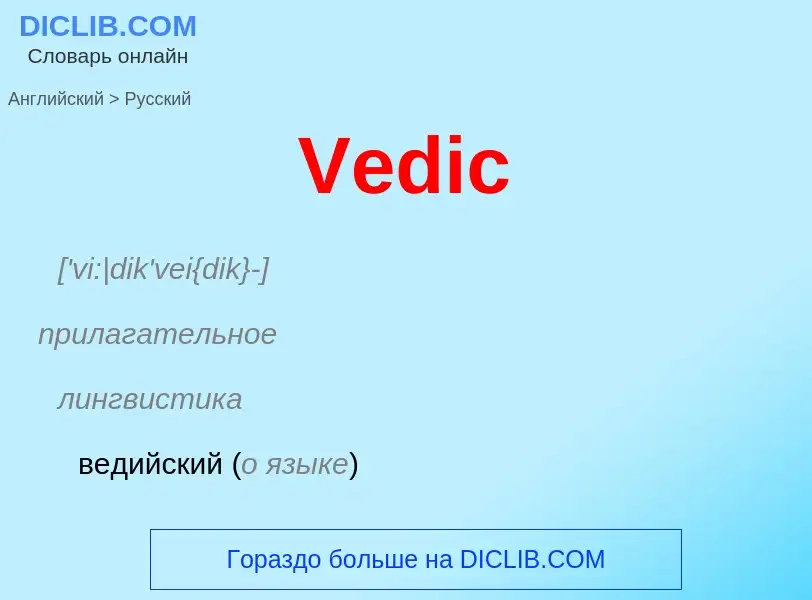Traducción y análisis de palabras por inteligencia artificial ChatGPT
En esta página puede obtener un análisis detallado de una palabra o frase, producido utilizando la mejor tecnología de inteligencia artificial hasta la fecha:
- cómo se usa la palabra
- frecuencia de uso
- se utiliza con más frecuencia en el habla oral o escrita
- opciones de traducción
- ejemplos de uso (varias frases con traducción)
- etimología
Vedic - traducción al ruso
['vi:|dik'vei{dik}-]
прилагательное
лингвистика
ведийский (о языке)
религия
ведический
относящийся к веданте
ведам
существительное
['vi:|dik'vei{dik}-]
лингвистика
ведийский язык
язык вед
['brɑ:məniz(ə)m]
синоним
Definición
Wikipedia

The Vedas ( or , IAST: veda, Sanskrit: वेदः, lit. 'knowledge') are a large body of religious texts originating in ancient India. Composed in Vedic Sanskrit, the texts constitute the oldest layer of Sanskrit literature and the oldest scriptures of Hinduism.
There are four Vedas: the Rigveda, the Yajurveda, the Samaveda and the Atharvaveda. Each Veda has four subdivisions – the Samhitas (mantras and benedictions), the Aranyakas (text on rituals, ceremonies, sacrifices and symbolic-sacrifices), the Brahmanas (commentaries on rituals, ceremonies and sacrifices), and the Upanishads (texts discussing meditation, philosophy and spiritual knowledge). Some scholars add a fifth category – the Upasanas (worship). The texts of the Upanishads discuss ideas akin to the heterodox sramana-traditions.
Vedas are śruti ("what is heard"), distinguishing them from other religious texts, which are called smṛti ("what is remembered"). Hindus consider the Vedas to be apauruṣeya, which means "not of a man, superhuman" and "impersonal, authorless," revelations of sacred sounds and texts heard by ancient sages after intense meditation.
The Vedas have been orally transmitted since the 2nd millennium BCE with the help of elaborate mnemonic techniques. The mantras, the oldest part of the Vedas, are recited in the modern age for their phonology rather than the semantics, and are considered to be "primordial rhythms of creation", preceding the forms to which they refer. By reciting them the cosmos is regenerated, "by enlivening and nourishing the forms of creation at their base."
The various Indian philosophies and Hindu denominations have taken differing positions on the Vedas; schools of Indian philosophy that acknowledge the primal authority of the Vedas are classified as "orthodox" (āstika). Other śramaṇa traditions, such as Charvaka, Ajivika, Buddhism, and Jainism, which did not regard the Vedas as authorities, are referred to as "heterodox" or "non-orthodox" (nāstika) schools.



![''Rigveda'' manuscript in [[Devanagari]] ''Rigveda'' manuscript in [[Devanagari]]](https://commons.wikimedia.org/wiki/Special:FilePath/Rigveda MS2097.jpg?width=200)

.png?width=200)


